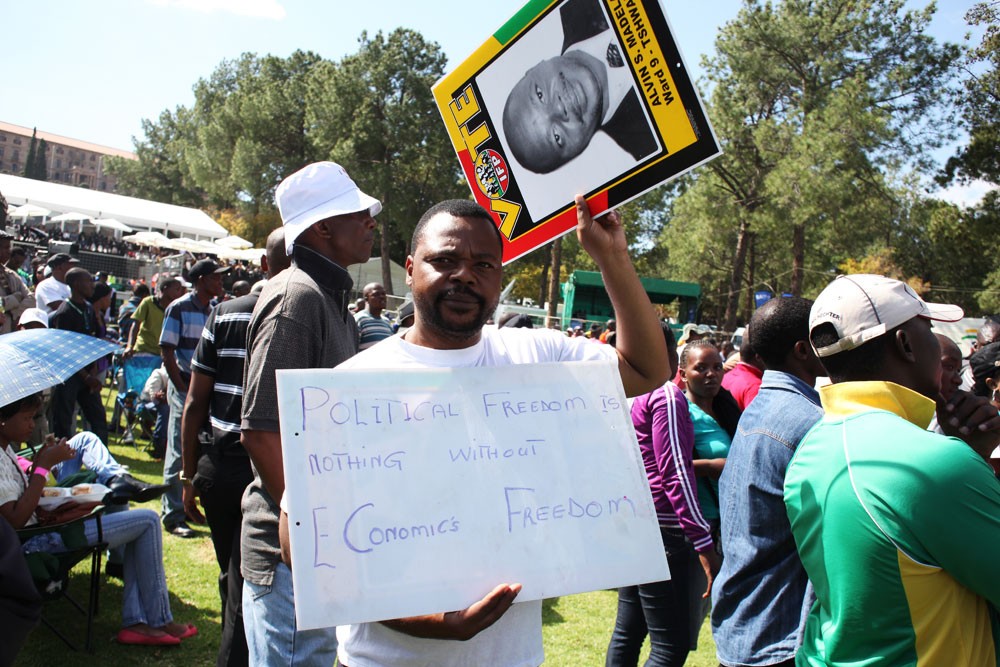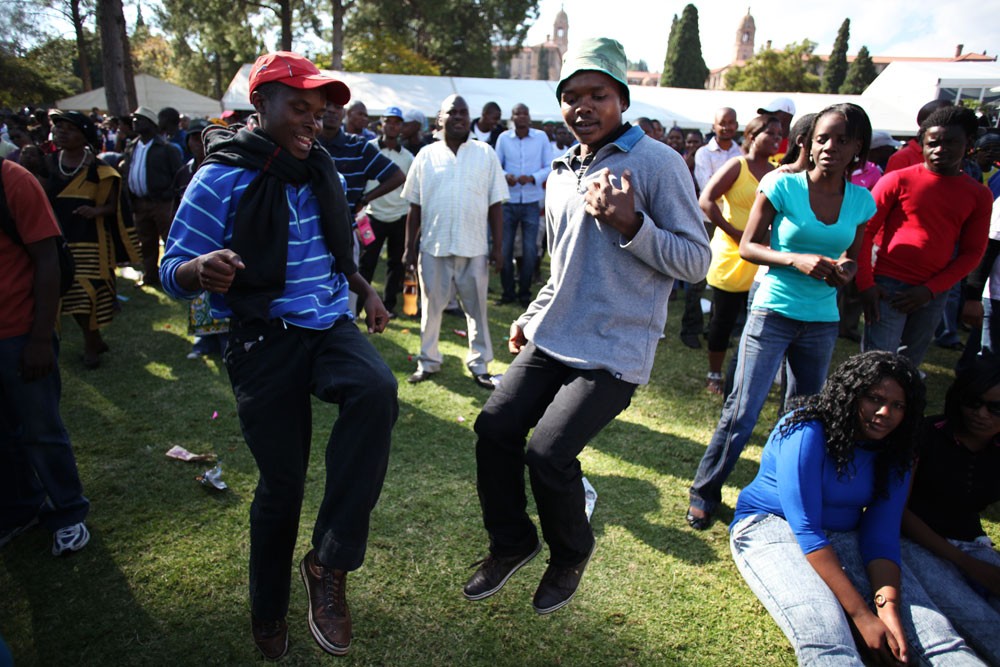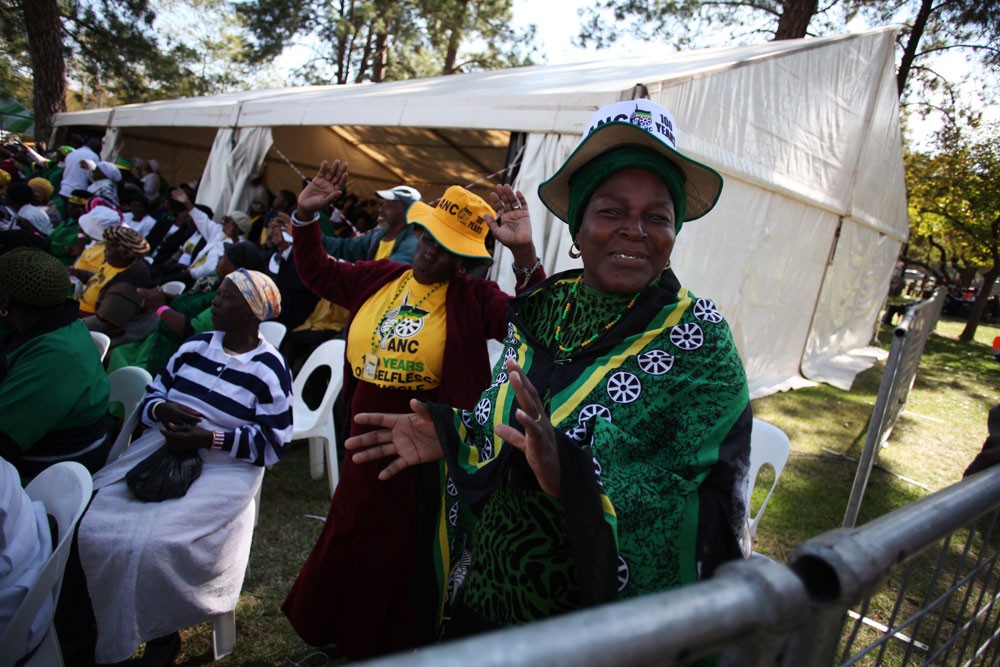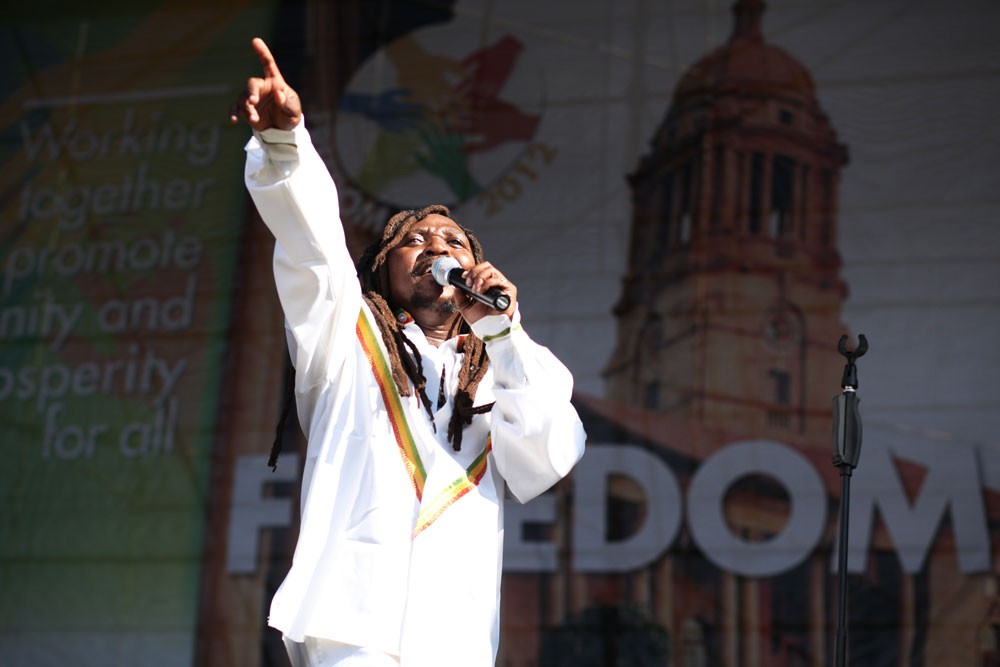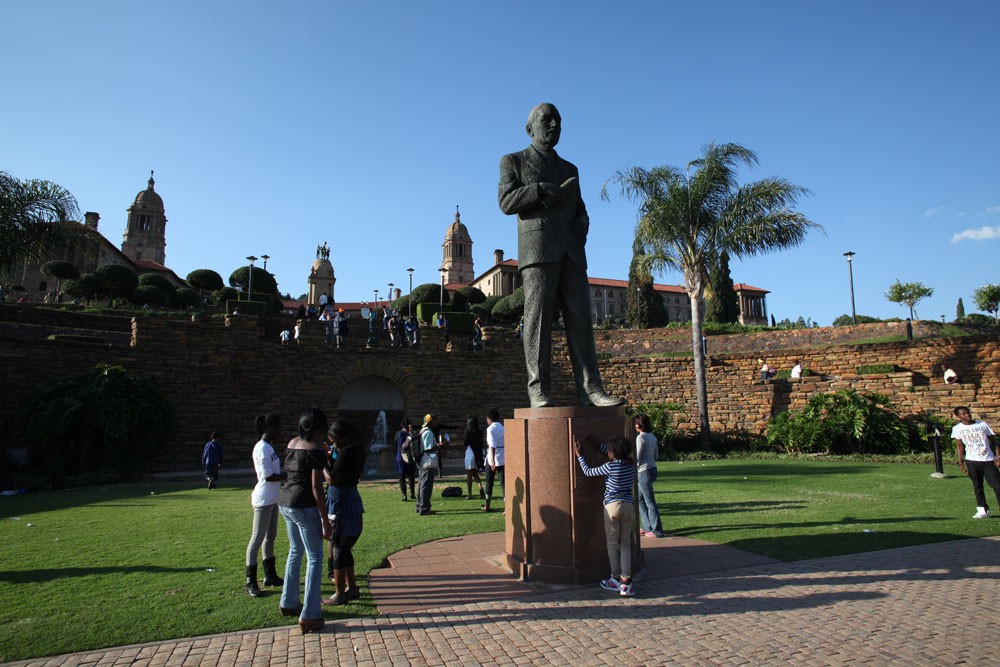In Pictures:
South Africa’s
18 years of ‘freedom’
President Jacob Zuma struggled to get the party started on the 18th anniversary of the end of apartheid.
Matthew Cassel Last Modified: 30 Apr 2012
Pretoria, South Africa - It was easy to hear the young woman shout out: "Marry me, Zuma!" when the South African president took to the podium.
Not only was she standing just next to me, it was one of very few sounds of excitement when Jacob Zuma prepared to address the crowd of thousands on Freedom Day in Pretoria.
The national holiday celebrates the end of apartheid in South Africa, and the country's first ever free and fair elections in 1994 - when Nelson Mandela, then head of the African National Congress (ANC), was elected president. The date, April 27, is commemorated each year outside the president’s offices at the Union Buildings in Pretoria.
But, despite the event being heralded by Zuma's speech, he wasn't the man at the focus of celebrations for much of the crowd."We are free because of Mandela," said Maria Mokari, a woman sitting under a tent in the "elderly" section near the back of the rally. Nelson Mandela, now a reportedly ailing 93-year-old, gave his inaugural address at the Union Buildings - an event attended by hundreds of thousands back 1994.
Mokari recognized Zuma as the president and said "sure" she supports him, but continued: "The real man who did this is Mandela.
"We pray that God will give him more days to lead this country."
As Zuma’s speech continued, much of the crowd held side conversations, and many fell asleep on the grass under the autumn day's gentle sunshine. Save a small group of a few dozen near the speaker's podium, very few of the thousands at Union Buildings seemed interested in the speech.While Zuma focused on "nonracialism" - a principle that defined the ANC and much of the anti-apartheid movement since the 1955 Freedom Charter - the racial element of the day could not be ignored. Not including myself, I counted no more than five or six white people among the crowd.
As Zuma spoke of diversity, a man walking through the crowd shouted: "What diversity?" - his hands outstretched amid the crowd of black faces.
Moments after his speech ended, a popular song came on that electrified the crowd. "Nelson Mandela, there is no one like you," sang the band in Zulu, and the crowd of thousands joined along with them.Hanging out with his friends on the steps of the Union Buildings, 17-year-old Matswi told Al Jazeera that it wasn't Mandela on his own who "freed" the country from nearly five decades of apartheid, "but he helped in the freeing of South Africa".
Matswi said he'd been inspired by Mandela, and described himself "as an aspiring freedom fighter".
For many, the day remains an emotional event.
Seventy-two-year-old Beauty Mmsiza described the incident that made her realise the injustice of apartheid when, in 1955, she, her father and her sister, watched as police beat her mother for leaving her identification papers at home. Her mother was then imprisoned for a number of months.
When asked how she felt today, Mmsiza replied: "Wow, I am so happy. I can walk in town at midnight, go to the [same] toilet [facilities as] white people, I can buy what they buy. Before it wasn't like this.
"Now, I can even talk to you."
View As One Page >>View As Slideshow >>
Start Slide Show
Stop Slide Show
1 / 15Matthew Cassel/Al JazeeraThe Freedom Day event was promoted with posters announcing an appearance by the South African president.
Matthew Cassel/Al JazeeraWhile the ANC commands the support of a majority of black South Africans, some supporters of other political parties say that until blacks gain economic rights, "freedom" has yet to be achieved.
Matthew Cassel/Al JazeeraPresident Jacob Zuma told the crowd: "Like a phoenix, a new society rose from the ashes of what was called 'a crime against humanity'."
Matthew Cassel/Al JazeeraMany in the audience appeared uninterested in Zuma's speech.
Matthew Cassel/Al Jazeera
 After hours of speeches by Zuma and others in his government, the party began in earnest.
After hours of speeches by Zuma and others in his government, the party began in earnest.
Matthew Cassel/Al JazeeraMusic was an important part of the resistance to apartheid, and much of it contained strong political messages.
Matthew Cassel/Al JazeeraFace paint and untied shoes were popular among the younger revellers.
Matthew Cassel/Al JazeeraNear to the crowd, a mobile clinic offered free HIV testing. In recent years the government has taken greater efforts to fight the spread of HIV/AIDS in South Africa.
Matthew Cassel/Al JazeeraMaria Mokari, a woman celebrating Freedom Day, said: "We pray that God will give [Mandela] more days to lead this country."
Matthew Cassel/Al JazeeraBeauty Mmsiza was 15 years old when she witnessed police beat her mother for not carrying her identification papers.
Matthew Cassel/Al JazeeraPatrick Mazwagi, a member of the Communist Party of South Africa and a supporter of the ANC, said that, after the first Freedom Day, when South Africans face problems "we resolve them all together".
Matthew Cassel/Al JazeeraThuthukani Cele and his One People Band perform for the crowd.
Matthew Cassel/Al JazeeraMany among the crowd cheering the musical performances praised Nelson Mandela and focused on the idea of unity.
Matthew Cassel/Al JazeeraRevellers were enjoying the music and happy to be photographed.
Matthew Cassel/Al JazeeraYoung people hang out beneath a stature of former South African Prime Minister JBM Hertzog in the gardens of the Union Buildings. Only two decades ago, it would have been unthinkable for black people to walk freely around the presidential compound.
Follow Matthew Cassel on Twitter: @justimage

